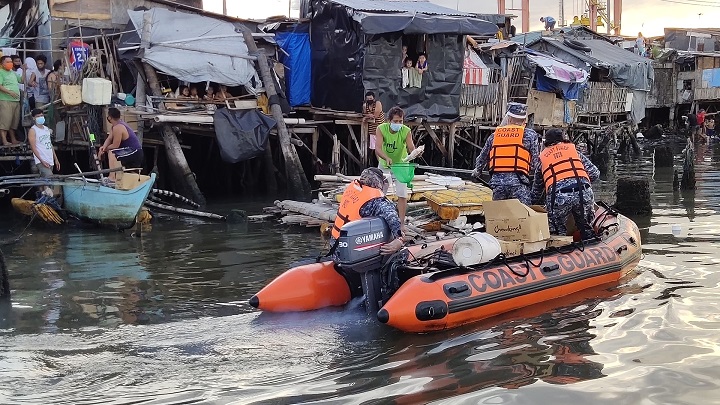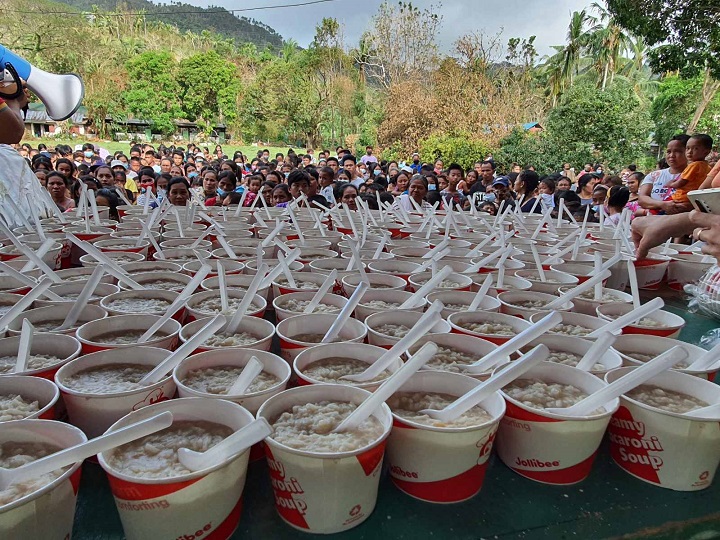Hunger continues to be rampant in the Philippines and was further aggravated by the COVID-19 pandemic. According to the latest Social Weather Survey (SWS) report, around 3 million Filipino families, or 11.8% of the whole population, have experienced involuntary hunger during the first quarter of 2022.
Natural disasters also further exacerbate food insecurity. The Philippines ranked 8th most at-risk country for disasters based on the 2021 World Risk Index. Disasters such as typhoons, earthquakes, and volcanic eruptions can reduce agricultural outputs, change food demand, and limit food distribution due to impaired transport and communication.
Recognizing the importance of access to food in disaster relief, Jollibee Group Foundation launched the FoodAID Program in 2013.

Empowering communities to prepare for disasters
The FoodAID Program harnesses Jollibee Group’s expertise and network to produce and distribute food items that are low cost, delicious, nutritious, and easy to prepare and store.
“We leveraged on Jollibee Group’s experience in meal preparation and product development to come up with specially developed food ingredients that can either be prepositioned in at-risk areas or immediately distributed when a disaster hits. This way, affected communities can have warm meals that are affordable without compromising the taste,” said Jollibee Group Foundation Executive Director Gisela Tiongson.
One of these food items is specially formulated congee mix packs that are distributed and pre-positioned with partners located in disaster-prone areas. With a shelf-life of six months, a congee pack mixed with rice and water can provide immediate nourishment to 100 people.
In 2020, Jollibee Group also developed ready-to-cook beef meatballs and sauteed chicken packs, which were distributed to communities affected by the pandemic.
To also help boost micro-enterprises during the pandemic, Jollibee Group Foundation trained karinderya (eatery) proprietors on food preparation, food safety, and customer service while serving meals to families in the most vulnerable communities. The Foundation and its partners provided selected families with food vouchers for 30 days. These vouchers were then used to purchase meals from participating karinderyas. This ensured the survival and operations of 320 karinderyas in Metro Manila, Bulacan, Cavite, and Rizal and served meals to 32,000 individuals during the pandemic’s peak period.

Immediate and extensive response
During disaster relief operations, Jollibee Group Foundation mobilizes its internal and external partners and resources, including Jollibee Group’s commissary, restaurants and franchisees, to organize feeding activities and directly distribute meals to affected families and communities.
The Jollibee Group’s vast network of partners is key to the company’s strategic disaster response as it provides critical assistance even in hard-hit and hard-to-reach areas.
In 2020 to June 2022, the FoodAID Program has distributed nearly 8.4 million meals for pandemic and disaster-affected communities across 358 cities and municipalities across 60 provinces with the help of 156 partners organizations.
Among them is Art Relief Mobile Kitchen (ARMK) which is provided ingredients to prepare hot meals. After Typhoon Odette hit in December 2021, ARMK received more than 700 kilos of marinated beef from JGF that were immediately brought to the disaster-stricken areas.
Through this partnership, JGF and ARMK served 10,900 meals in Butuan and Surigao. Precious Leaño, one of ARMK founders, recalled how beneficiaries were pleasantly surprised that fresh beef was being served. “Some people were jumping for joy,” Leaño said.
“Our partnership with Jollibee Group Foundation is a big part of being able to feed people who are affected by disasters. When a disaster strikes, people really need comforting food. The minute it hits the tummy and they feel that warmth go through their bodies, their senses awaken. They can begin to think about rebuilding and moving forward,” she added.
Jollibee Group franchisees have also been an active part of the FoodAID Program’s implementation system. Tess Lao rallied fellow franchisees after Typhoon Odette hit in December 2021 and raised cash and other in-kind donations. Reflecting on her experience, Tess related, “It is a way of life for franchisees and team members. They really want to help. We share the joy through the products we serve, through the little help we can give and by being there. The Jollibee Group can reach even the farthest community.”
Support to recover and rebuild
The Foundation also extends support that benefits communities beyond the immediate aftermath of disasters. It provides partner farmers with assistance to get back on their feet through the Farmer Livelihood Recovery Program.
Prior to the pandemic, Jollibee Group Foundation would also organize special school feeding through its Busog, Lusog, Talino (BLT) School Feeding Program (to aid children and teachers in getting back to their school routine.
“Through our FoodAID Program, we will continue to rally our partners towards extending assistance to our kababayans and share hope as they recover during difficult times,” Tiongson added.

